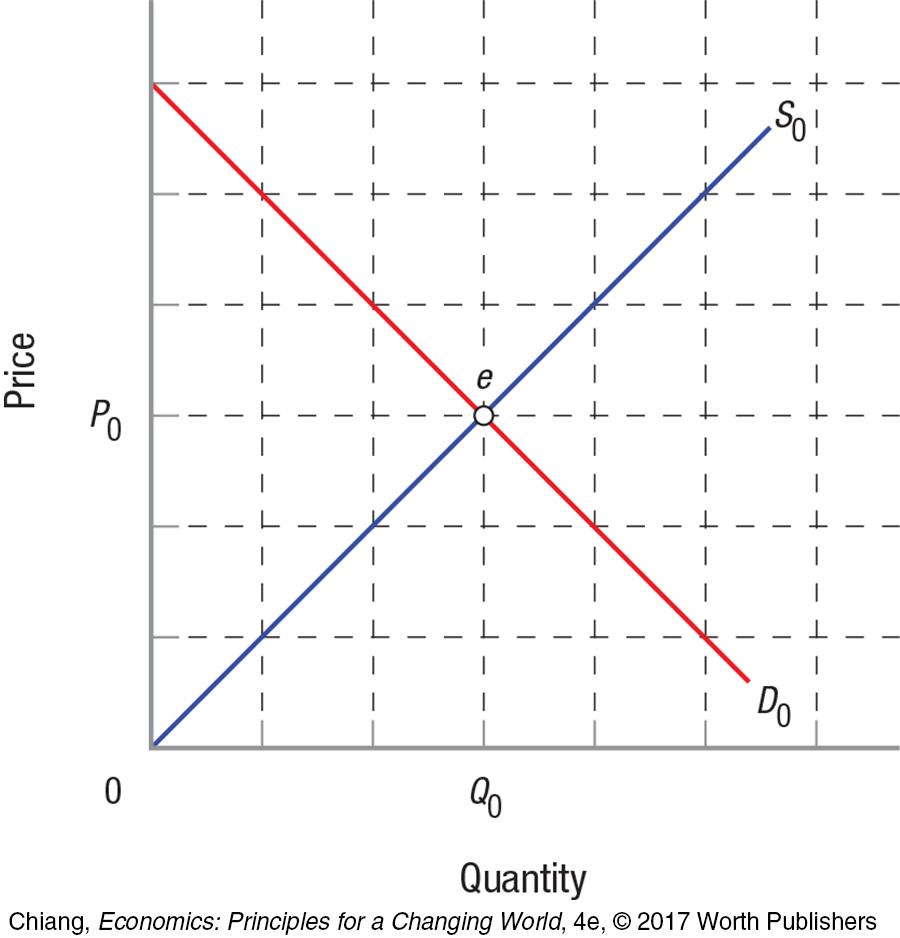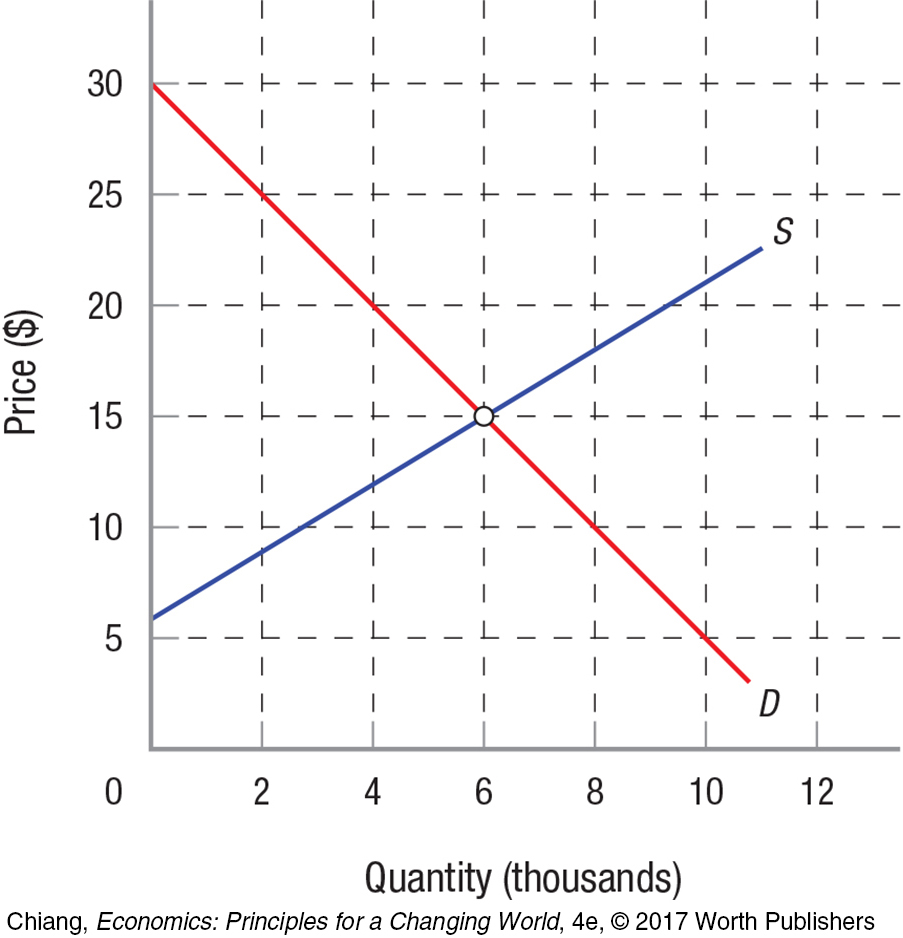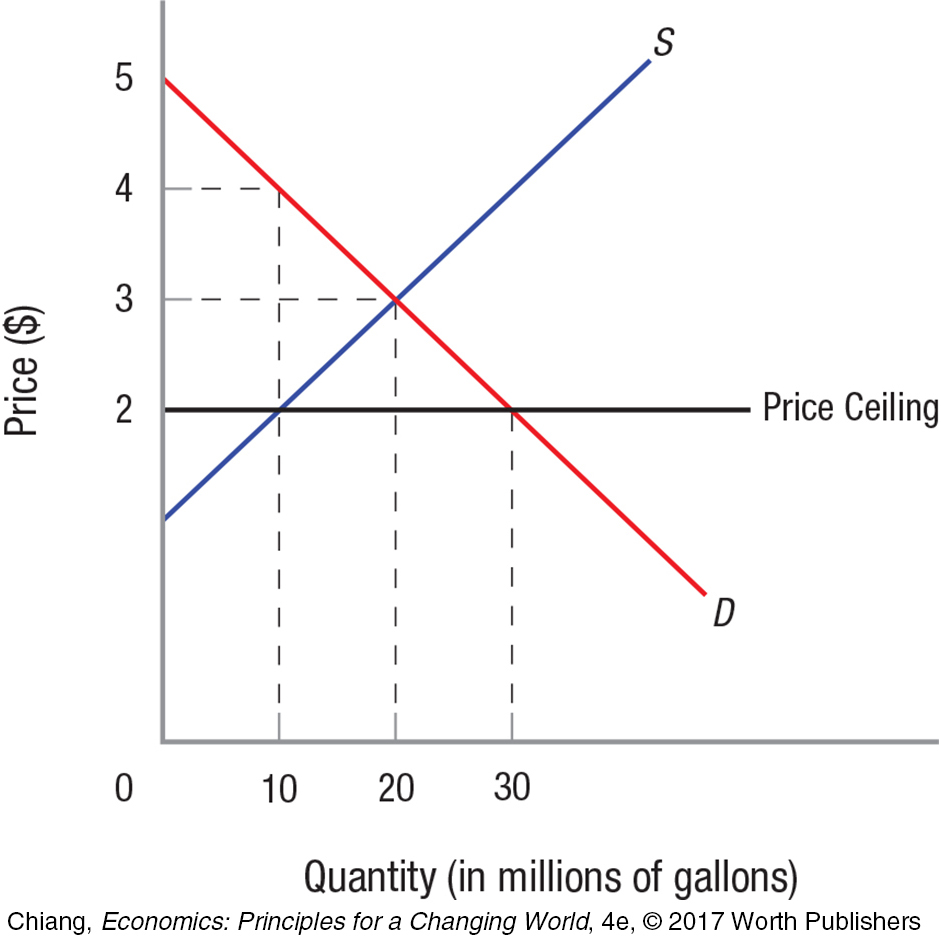QUESTIONS AND PROBLEMS
Check Your Understanding
Question 4.1
1. Describe how consumer surplus and producer surplus are measured.
Question 4.2
2. Using the following graph, show what happens to consumer surplus when a new technology reduces the cost of production.

Question 4.3
3. Explain why deadweight loss can occur with a price below equilibrium even when some consumers benefit from it.
Question 4.4
4. Provide three examples of activities that generate external benefits and three activities that generate external costs.
Question 4.5
5. Why does an effective price ceiling appear below the equilibrium rather than above it?
Question 4.6
6. If a price floor is reduced toward equilibrium but not below it, explain what happens to the total surplus and deadweight loss in this market.
Apply the Concepts
Question 4.7
7. An increasing number of charities have turned to online auctions as a way to raise money by selling unique experiences donated by celebrities (such as a meet-
Question 4.8
8. Luigi’s is the only pizzeria in a small town in northern Alaska. It is constantly busy, but there is never a wait for a table. One of Luigi’s friends suggests that he would earn much more money if he raises his menu prices by 25%, because no one is likely to open a new pizzeria in the near future. If Luigi follows his friend’s advice, what would happen to consumer and producer surplus, and efficiency, in this market?
Question 4.9
9. Over the past decade, many American candy companies, including Hershey Company, Brach’s Confections, and Ferrara Pan Candy, opened factories in Mexico and Canada to produce candy that is then shipped back to the United States for sale. Although lower wages in Mexico might explain part of this move, wages in Canada are comparable to U.S. wages. Explain how U.S. price supports (price floors) for the sugar industry may have encouraged these moves.
Question 4.10
10. Academic studies suggest that the amount people tip in restaurants is only slightly related to the quality of service, and that tips are poor measures of how happy people are with the service. Is this another example of market failure? What might account for this situation?
Question 4.11
11. In cities around the country, the government provides assistance to families with low incomes to rent apartments at prices capped by the U.S. Department of Housing and Urban Development (HUD), essentially setting a price ceiling on apartments. These designated apartments tend to rent quickly, and tenants are less likely to move once they find an apartment. Explain how rent controls affect market prices for non-
Question 4.12
12. The U.S. Department of Labor reports that of the roughly 150 million people employed, just over half are paid by the hour, but fewer than 5% earn the minimum wage or less; 95% of wage earners earn more. And of those earning the minimum wage or less, 25% are teenagers living at home. If so few people are affected by the minimum wage, why does it often seem to be such a contentious political issue?
In the News
Question 4.13
13. Over the past few years, several U.S. states have either legalized recreational marijuana or at least decriminalized its use (“Would Legalizing Marijuana Help the Economy?,” Debate.org). Proponents argue that legalizing the use of marijuana would help the economy by boosting economic activity and reducing costs. Do you agree? Why or why not? Use the concepts of supply and demand, and consumer and producer surplus to support your answer.
Question 4.14
14. In 2015 Governor Cuomo of New York approved a measure to raise the minimum wage for all fast-
Solving Problems
Question 4.15
15. Consider the market shown in the following graph.

Compute the consumer surplus.
Compute the producer surplus.
Now assume that government puts a price floor on this product at $20 a unit.
Compute the new consumer surplus.
Compute the new producer surplus.
Would consumers or producers be more likely to have their advocates or lobbyists support price floors? Explain.
WORK IT OUT  | interactive activity
| interactive activity
Question 4.16
16. Suppose the U.S. government places a price ceiling on the sale of gasoline at $2 per gallon in the accompanying figure.
How much of a shortage or surplus of gasoline would result?
Calculate the effects of this policy in terms of the changes in consumer surplus and producer surplus.
How much deadweight loss is created?
What would happen if the price ceiling is raised to $5 per gallon?

 USING THE NUMBERS
USING THE NUMBERS
Question 4.17
17. According to By the Numbers, how much would you earn in one year if you worked 2,000 hours (50 weeks × 40 hours) at the federal minimum wage? How much more would you earn per year if you worked at the minimum wage rate in Washington state?
Question 4.18
18. According to By the Numbers, which state has the highest average in-